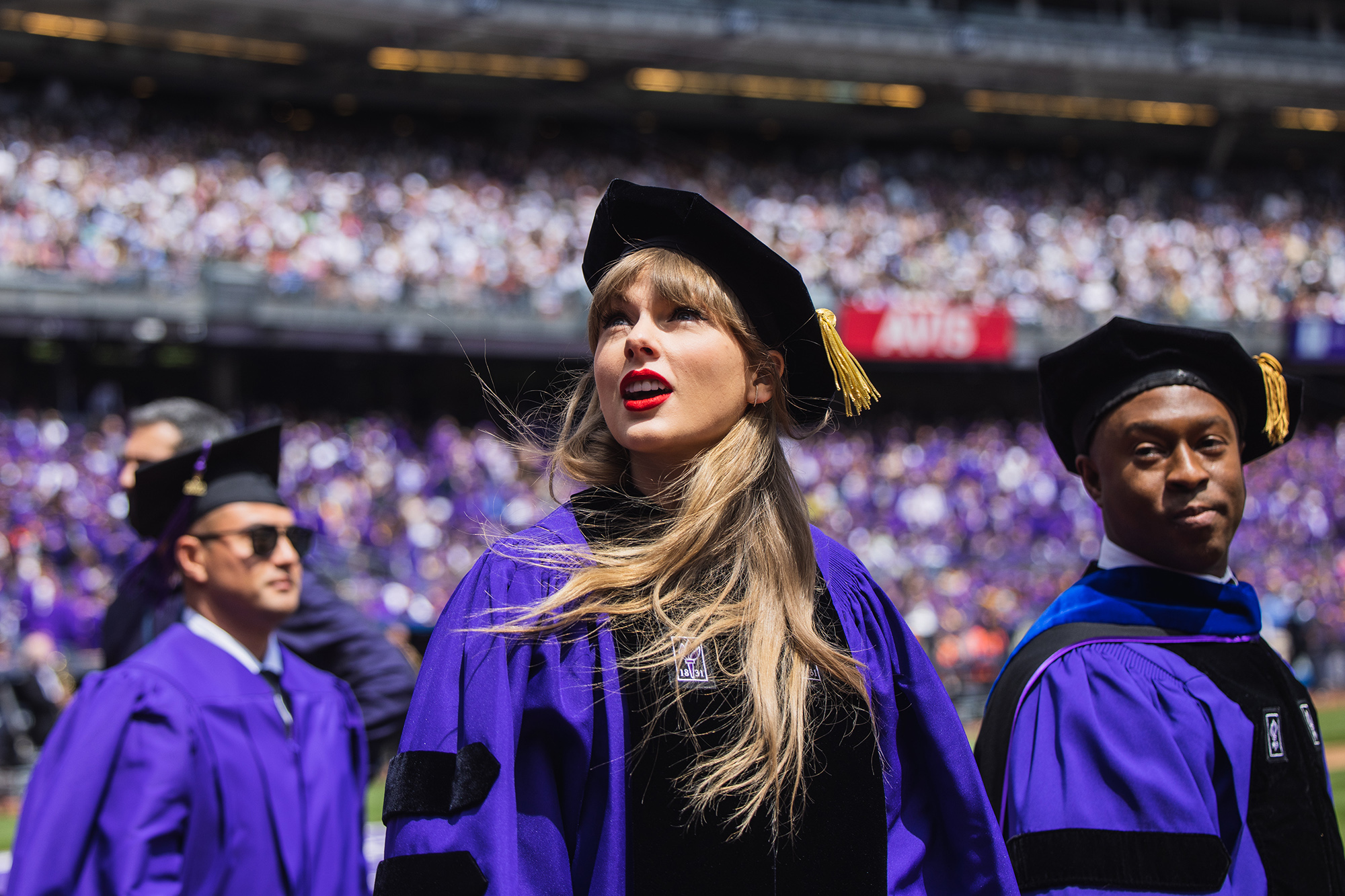Taylor Swift is a name synonymous with chart-topping hits, cultural influence, and a fanbase that spans the globe. From her early days as a country music prodigy to her current status as a pop culture titan, Swift’s journey is filled with fascinating details that reveal the depth of her character and the forces that shaped her. Here, we dive into eight lesser-known facts about the superstar, shedding light on her unique upbringing, personal struggles, and the quirks that make her one of the most relatable yet extraordinary figures in music today.
A Name Chosen to Defy Gender Bias
When Taylor Alison Swift was born on December 13, 1989, her mother, Andrea Swift, made a deliberate choice that would set the tone for her daughter’s future. Andrea, who had navigated the male-dominated world of business, was acutely aware of how gender could influence opportunities. She had seen women overlooked or unfairly judged simply because their names revealed their gender on resumes or applications. Determined to give her daughter an edge, Andrea chose the name “Taylor,” inspired by the American singer-songwriter James Taylor. The name was intentionally gender-neutral, neither overtly masculine nor feminine, to ensure that Taylor would face fewer biases, at least on paper, as she pursued her ambitions.
This decision reflected Andrea’s forward-thinking approach and her desire to empower her daughter in a world where systemic inequalities persisted. While Taylor would later carve her path in music, the name choice symbolized a foundation of resilience and equality that would define her approach to her career and advocacy. It’s a subtle but powerful reminder of how thoughtful parenting can influence a child’s trajectory, and it underscores Swift’s connection to breaking barriers, both for herself and her fans.
A Banking Dynasty Behind the Music
Taylor Swift’s family background is rooted in financial acumen, a legacy that contrasts with her artistic persona. Her father, Scott Swift, hails from a lineage where three generations served as bank presidents, with other relatives holding prominent roles in financial institutions. Scott himself worked as a stockbroker, a career he pursued with passion and dedication. From a young age, Taylor was exposed to conversations about money management, savings, and strategic investments. Scott instilled in her the importance of financial independence, encouraging her to view wealth-building as a means of self-empowerment.

In interviews, Taylor has shared how her father’s enthusiasm for his work mirrored her own love for music. She recalls how discussions about her achievements would often segue into Scott’s animated explanations of stock markets and investment opportunities. This financial grounding gave Taylor a unique perspective, blending creative artistry with a savvy understanding of business. Her ability to negotiate lucrative deals, maintain control over her masters, and build a billion-dollar empire reflects the influence of her family’s financial heritage.
Dreams of Finance Before Fame
Surprisingly, Taylor Swift’s childhood ambitions leaned toward finance rather than music. Inspired by her father’s zeal, she once envisioned herself as a financial advisor, helping others navigate wealth and investments. As her peers dreamed of becoming astronauts or ballerinas, young Taylor was captivated by the idea of emulating her father’s career. She admired his happiness and dedication, seeing it as a model for professional fulfillment.
However, her trajectory shifted as music took center stage. Influenced by her grandmother, Marjorie Finlay, a beloved opera singer, Taylor discovered her passion for performing and songwriting. The pull of music proved stronger than her early financial aspirations, but the discipline and strategic thinking she absorbed from her family remained. These qualities have been evident in her meticulous career planning, from her genre transitions to her innovative marketing strategies, proving that her early dreams of finance found expression in her business-savvy approach to music.
A Childhood Fascination with Music Documentaries
While other children were glued to Disney movies, Taylor Swift was engrossed in Behind the Music, a 1997 documentary series chronicling the lives of pop and rock stars. The show offered raw, unfiltered glimpses into the triumphs and pitfalls of fame, and Taylor watched it repeatedly, absorbing its lessons. She was particularly struck by stories of artists who lost their way due to a lack of discipline or focus, some recovering through self-awareness, others succumbing to their own hubris.
These insights shaped Taylor’s approach to her career. She vowed to maintain control over her artistic vision and avoid the mistakes she saw in others. This early exposure to the realities of the music industry gave her a maturity beyond her years, helping her navigate the pressures of fame with a clear-eyed perspective. Her commitment to authenticity and growth as an artist can be traced back to those formative hours spent watching music’s cautionary tales.
The Lucky Number 13
For many, the number 13 is a harbinger of bad luck, but for Taylor Swift, it’s a talisman of fortune. Born on December 13, 1989, Taylor turned 13 on a Friday the 13th, a date often considered ominous. Yet, she embraced the number, seeing it as a recurring symbol of good fortune. Her debut album won an award 13 weeks after its release, and her first single was introduced with a 13-second clip. At award shows, she often found herself seated in the 13th seat or row, moments that coincided with her victories.

Taylor’s affection for 13 became a signature quirk. She would draw the number on her hand before performances, a ritual that fans came to recognize and celebrate. This embrace of a supposedly unlucky number reflects her ability to redefine narratives, turning perceived negatives into sources of strength—a theme that resonates throughout her career and personal philosophy.
Isolation at Age 12
At 12, Taylor Swift experienced a pivotal moment that highlighted the cost of early success. She was invited to sing the national anthem at a high-profile Philadelphia 76ers basketball game in her home state of Pennsylvania. Her performance was met with acclaim, marking a stepping stone in her budding career. However, the spotlight came with a price. Her peers, perhaps envious or uncomfortable with her rising fame, began to distance themselves, labeling her a “nuisance.”
This experience of being ostracized left a lasting impression. Taylor has spoken about feeling uneasy with the praise she received, grappling with the isolation that accompanied her talent. It was an early lesson in the complexities of fame, teaching her resilience and the importance of staying true to herself despite external judgment.
The Perpetual Outsider
Despite her accolades—11 Grammy Awards, 25 Billboard Music Awards, and a net worth exceeding $1 billion—Taylor Swift has often felt like an outsider. In a candid Vogue interview, she reflected on her insecurities, recalling how she was mocked in school for her love of country music, flowy dresses, and cowboy boots. These experiences of being “different” shaped her identity, fueling her determination to succeed on her terms.
By 16, Taylor learned to tune out the noise, focusing on her music and her dream of becoming a singer. She embraced her imperfections, recognizing that the people she admired were also flawed in their youth. This perspective allowed her to connect with fans through her honest, relatable songwriting, turning her sense of being an outsider into a universal anthem for those who feel misunderstood.
A Scholar at Heart
Taylor Swift’s academic prowess is another lesser-known facet of her story. From preschool, she excelled in her studies, maintaining a perfect 4.0 GPA during her homeschooling years in middle and high school. Despite her music career preventing her from attending college, she always harbored a desire to pursue higher education. Her dedication to learning culminated in May 2022, when she received an honorary Doctorate of Fine Arts from New York University.

At the NYU commencement, Taylor delivered a speech that resonated with graduates, blending humor and wisdom as she reflected on her journey. The honor recognized her contributions to music and her advocacy for artists’ rights and social justice, cementing her legacy as not just a performer but a cultural and intellectual force.
Conclusion
Taylor Swift’s story is one of contrasts: a gender-neutral name chosen to defy bias, a financial legacy that shaped her business acumen, and a childhood marked by both ambition and isolation. Her quirks—like her love for number 13 and music documentaries—reveal a woman who has always been introspective, resilient, and determined to chart her own path. From feeling like an outsider to becoming a global icon, Swift’s journey reminds us that authenticity and perseverance can transform challenges into triumphs. Her ability to connect with millions while staying true to herself is what makes her not just a pop star, but a phenomenon.


